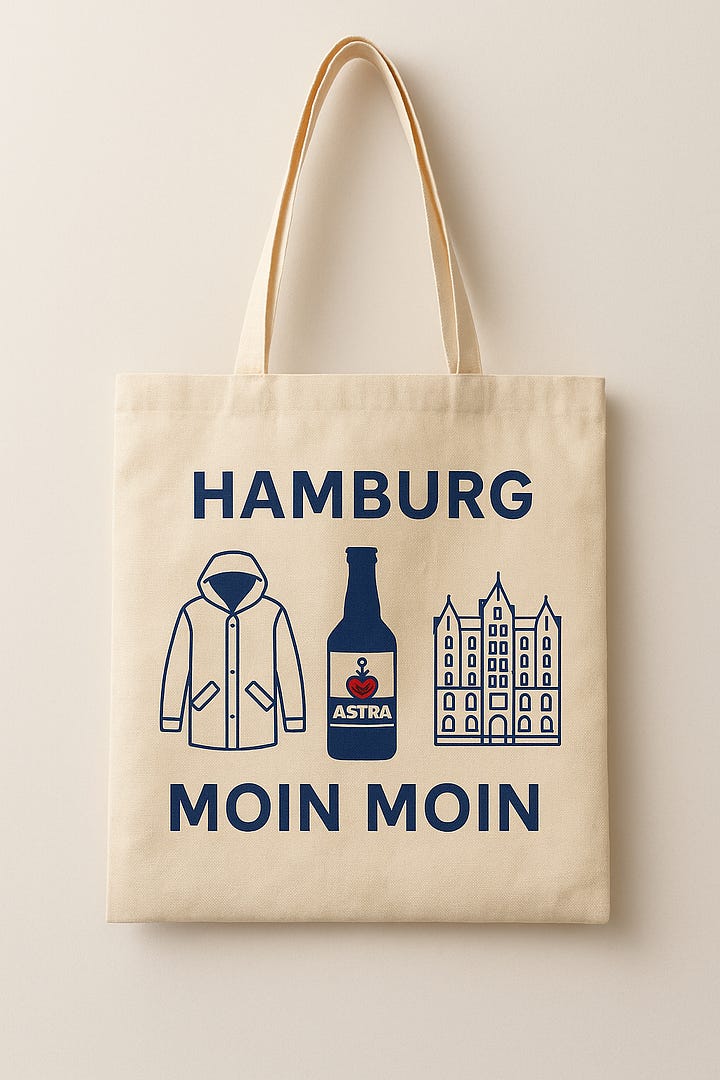A few months ago, I received a letter in the mail from the Institute for Employment Research (IAB), which is part of the German Federal Employment Agency (Bundesagentur für Arbeit). They invited me to take part in an online survey about my job, family life, and general satisfaction as an Ausländerin living here in Germany. The survey audience was a representative sample of 50,000 people born abroad who immigrated to Germany between the ages of 18 and 65. As we established in my last newsletter, yours truly fits into this age category.
Having lived here for nearly a decade, my first reaction to being contacted out of the blue on behalf of the IAB was to sit and ponder how they got my mailing address from the Federal Employment Agency, until I made the connection between the two. Still, hello, Datenschutz. My second thought was that I would go ahead and complete the survey anyway, despite the obvious breech in data protection, mainly because it only took about ten minutes and it came with a 5€ gift card to a store of my choice. I picked IKEA, because you can never have too many tea light candles.
I had completely forgotten about the survey until I was scrolling through my emails to find this article from Deutsche Welle, reporting on the survey results. According to the article, Germany, a country facing a growing labor shortage and an aging population, and therefore in desperate need of international skilled labor, is apparently not that popular among immigrants living here. Study results indicated that 26 percent of respondents, or around 2.6 million people, said they had considered leaving Germany in the past year. Moreover, three percent of respondents, or roughly 300,000 people, had concrete plans to leave.
What stood out most, though, was who was thinking about leaving: highly educated, high-earning immigrants. The IAB noted in the article, “A key finding of our survey is that it is precisely those who moved to Germany to work or study, who are better educated or more economically successful and who have a better command of the German language, are more likely than average to consider leaving or express concrete plans to emigrate.”
Obviously, no one has been reading my newsletter about how great it is to live here. I mean, what could be better than living in a country with Spaghettieis, Rechts vor Links, and Brückentage? Well, the main pull factor for survey respondents wanting to return home was due to family reasons (understandable), while those wanting to move to another country were in search of better career opportunities and higher income (also understandable). On the flip side, push factors for wanting to leave Germany included high taxes and social security contributions, excessive bureaucracy, and discrimination (ouch). According to the survey results in the article, "Almost two-thirds of immigrants report perceived discrimination, for example at work, on the housing market, in public spaces or in contact with the police. A third of immigrants also feel either not at all or only slightly welcome. These are factors that significantly increase the tendency to emigrate."
However, there is no need to worry, because the German government has a plan. As the article pointed out, the Alternative for Germany (AfD) party has been advocating for a while now to deport people with non-German roots and the Christian Democratic Union (CDU) recently abolished any plans the Ampelkoalition put in place to fast-track citizenship for qualified immigrants. Such rhetoric could lead one to assume that most German lawmakers do not understand the difference between immigration and emigration. Furthermore, a prime example is the CDU’s brilliant idea to require international medical students to work for at least five years in rural areas in Germany, where there is a growing shortage of medical professionals, largely because most Germans themselves have no interest in living in rural Germany. According to Tino Sorge, a CDU-member of the Bundestag from Saxony-Anhalt, Germany “must attract young doctors to work in Germany instead of watching them leave.” Great idea. Rather than creating laws and policies that foster a real Willkommenskultur in Germany, why not simply ship international graduates off to the middle of nowhere, or, say, Saxony. Ok, ok, enough with the Sachsenbashing already.
And so, as a self-proclaimed expert on German life and culture, and as someone who has spent roughly a third of their life in Germany, I have taken it upon myself to step in where the government has so devastatingly failed and come up with a few ways to help my fellow immigrants feel more welcome in Germany.
Welcome Bags
Is there anyone out there who doesn’t have enough tote bags, or Jutebeutel, as they’re called in Germany? Just in case there some people who don’t use exactly one tote bag and stash the other fifty in a closet somewhere, why not roll out some welcome bags for immigrants when they arrive in Germany?
After all, every hipster in Berlin has a Jutebeutel, and it is a great way to show off your affiliation with any cool cause or trendy brand. Why not take this cultural staple and turn it into a welcome gesture? There could even be different tote bags for different regions, with some small gifts specific to the part of Germany newcomers are moving to. Here are a few examples based on cities in Germany with the highest number of immigrants:




Frankfurt
A bottle of Possmann Apfelwein (Das Beste, was ein Apfel werden kann)
A fast-pass to the Ausländerbehörde (you get to skip the 5 a.m. line, but you still have to make an appointment, of which there are none)
The seven herbs in Grüne Soße, but without the recipe. Schmand, Mayo, Joghurt, figure it out yourself.
A skyline magnet or Euro sign keychain, as a reminder of why the housing prices in the Rhine-Main Metropolitan region are so absurd
Berlin
Club Mate with Club Havana (ClubClub) from the neighborhood Späti
An extra Jutebeutel, just because it’s Berlin
An all-black starter outfit to wear in the summer or to Berghain (if they let you in)
English-language phrasebook: “One Matcha Latte with oat milk,” “Is this Döner vegan?”, or “Do you speak English?”
Munich
Vacuum-sealed Weißwurst for tomorrow’s breakfast
Table reservation at the upcoming Oktoberfest, but don’t forget it starts in September
A mini handheld broom to clean up after yourself, because there is no littering in Munich
A Tracht starter set, because tradition reigns supreme
Hamburg
A rain jacket which you will need all year
A bottle of Astra
Tickets to Miniatur Wunderland
A guide on how to use Moin correctly
Schrebergarten Lottery
Most people are familiar with the Green Card Lottery in the U.S., but the program is actually called the Diversity Immigrant Visa (DV) Program, administered by the Department of State. The goal of the program is to offer a lottery system for individuals from countries with low rates of immigration to the U.S. by granting them a Green Card, or permanent residency, through random selection. Wow, imagine how special and welcome you would feel if the U.S. Department of State randomly chose you as one of the 55,000 immigrants to live in the United States through the Green Card Lottery each year!
Although, on second thought, this concept wouldn’t quite work in Germany, where obtaining a residence permit is a fairly transparent and straightforward process, as long as you can get an appointment at the Ausländerbehörde. No, what we need here to make immigrants feel more welcome is something even more coveted and selective than a residence permit, something that most people in Germany without an outdoor space of their own dream of: a Schrebergarten.
Schrebergärten are basically urban garden plots located in and around cities in Germany. Usually, a Schrebergarten, or Kleingarten, belongs to a local association and is regulated at the federal level through the Bundeskleingartengesetz. According to this Wikipedia article citing the Federal Office for Building and Regional Planning and the Federal Ministry for Housing, Urban Development and Building, in 2008 only 7.5% of Kleingarten members in Germany had an immigration background. Although this statistic from 2008 is relatively old, the Statistisches Bundesamt reported in 2022 that 24.3.% of the total population in Germany had an immigration background, meaning that immigrants are drastically underrepresented when it comes to buying used kitchens from Kleinanzeigen and planting tomatoes. What better way to address this disparity than by diversifying the Schrebergarten population through a lottery system?
luca app to Avoid Microaggressions
Although roughly a quarter of the German population has an immigration background, certain stereotypes about what a “typical German” looks like still persist. For example, while I was on vacation in Spain earlier this year, one of the hotel employees greeted me in German before I even had the chance to interject and inform them that I am, in fact, not German. Naturally, I was extremely offended by this assumption and have since vowed to incorporate even more athleisure into my wardrobe, start all my sentences with “So,” and take my Stanley Cup with me everywhere I go.
However, many German citizens experience the exact opposite on a daily basis. While this may not directly impact immigrants in Germany who do not hold citizenship, it certainly does little to support the country’s so-called Willkommenskultur. So, how can we begin to address and ultimately eliminate these everyday microaggressions? Let’s think back to the COVID-19 pandemic; a time that, despite its many challenges, accelerated the adoption of remote work, gave Microsoft Teams widespread traction, and introduced us to the luca app. For those who may not recall, the luca app was initially developed for contact tracing and, later, for managing restaurant check-ins. Could we imagine repurposing this once crucial app to help address social and cultural insensitivity? For instance, the app might offer guidance on respectful communication, helping users navigate common pitfalls such as asking banal questions like, “Where are you really from?” Perhaps a reinvented luca app focused on everyday cultural awareness and etiquette is just what Germany needs: part digital innovation, part social compass.
In the meantime, if Germany wants to retain highly skilled, multilingual, tax-paying immigrants, it might be time to actually create policies that don’t make immigrants feel like they are navigating an elaborate escape room challenge, but rather feel like an actual invitation. Until then, maybe the government will have more luck implementing my suggestions, by welcoming newcomers with regional tote bags, developing a Schrebergarten lottery system, and helping people avoid microaggressions like the next pandemic.
As always, thanks for reading, Buh-bye and Auf Wiedersehen!




I feel the same where I live. And most skilled people who get here to be treated like crap had good living standards where they came from. I've seen many people leave because of that, while the unskilled immigrants stay because it's better than what they had. On top of that our own "afd" sends letters saying immigrants aren't welcome 🤣.